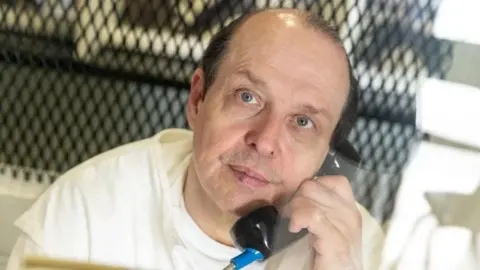Robert Roberson's execution can resume, Texas Supreme Court rules
 Innocence Project/ Ilana Panich-Linsman
Innocence Project/ Ilana Panich-LinsmanA Texas Supreme Court has said the execution of Robert Roberson - a Texas man who was convicted of killing his two-year-old daughter - can proceed.
He was set to be the first person in the US to be executed for a murder related to "shaken baby syndrome", but legal challenges, prompted by some public outcry, paused the execution at the last minute last month.
The Texas Supreme Court's decision means a state court judge will set a new execution date.
Roberson has long maintained his innocence. His lawyers say new evidence shows the child died of complications from pneumonia.
Just hours before Roberson, 57, was set to be executed on 17 October, a bipartisan group of lawmakers in the Texas House of Representatives issued a subpoena for him to testify in a hearing that would take place after his execution date.
A Travis County judge then issued a temporary restraining order to stop the execution going ahead before the hearing took place.
But on Friday, weeks after that subpoena was issued, the Texas Supreme Court said that group of lawmakers did not have the authority to override Roberson's scheduled execution with a subpoena and the execution should now move forward.
The lawmakers' last-minute attempt last month followed Roberson pleading for leniency. He also lost multiple appeals in state courts.
A Texas parole board rejected Roberson's bid for clemency and Texas Governor Greg Abbott declined to halt Roberson's execution as well.
With their subpoena, Texas lawmakers said they planned to address questions surrounding Roberson's case and new scientific developments that could impact his conviction.
While scientific experts and Phil McGraw, the television host known as Dr Phil, spoke at the hearing, Roberson did not.
The state's attorney general refused to allow Roberson to appear in person at the hearing for security reasons.
The legislature also refused to have Roberson appear virtually because he has autism and he is not familiar with modern technology after spending 20-plus years in prison.
Among the topics discussed at the hearing was Texas' junk science law, which lets inmates challenge convictions based on later discredited science.
Mr McGraw was among the people who said that law might have affected Roberson's case.
Roberson was originally sentenced to death in 2003 for the death of his daughter, Nikki Curtis.
A post-mortem examination found she died of injuries from abuse but Roberson says his daughter fell out of her bed and when he returned hours later she was not breathing.
He took her to an emergency room where she was pronounced dead.
While medical staff immediately suspected abuse, Roberson's lawyers argued his daughter was prescribed medicines that are no longer given to children because they can cause serious complications and that, along with the fall, was the cause of her death.
In 2023 an appeals court agreed there was insufficient evidence to overturn Roberson's conviction. The Supreme Court declined to hear his case.
"Shaken baby syndrome" - now called abusive head trauma - is usually diagnosed after finding evidence of retinal haemorrhage, brain swelling and bleeding in the brain.
While the diagnosis is broadly accepted by the medical community, a recent report highlighted the need to thoroughly examine other causes before concluding injuries were due to abuse.
